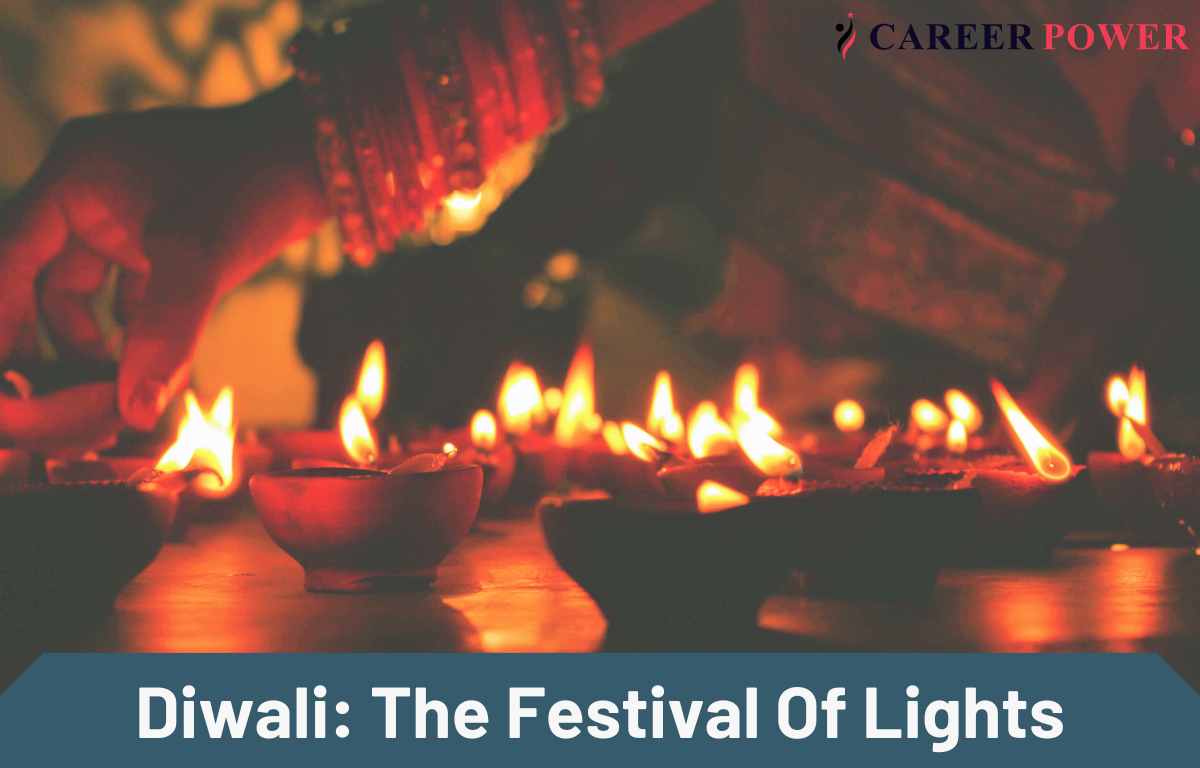Diwali, a festival of light is the most popular festival in India which symbolizes the spiritual “victory of good over evil, light over darkness, and knowledge over ignorance”. This year Diwali 2024 is going to be celebrated on 1st November 2024, Friday. It is an important religious festival originating all across India. Most people think of Diwali as a Hindu festival, but it is also celebrated by Sikhs and Jains with the same enthusiasm and happiness. In India, people celebrate the story of King Rama’s return to Ayodhya after defeating Ravana. People celebrate Diwali by lighting rows of clay lamps, Lakshmi puja, firecrackers festivities, and distributing sweets.
Essay on Diwali Festival
Diwali is observed annually in October or November, on the twentieth day following the Dussehra holiday, this year it is being celebrated all over on the first day of November 2024. Families and friends come together to enjoy the event, share delicious food, and exchange gifts. On this day, people also worship the goddess of wealth, Lakshmi. One of the primary customs of this Hindu holiday is lighting diyas. As part of the Diwali festival, people purchase lovely ceramic diyas every year and light up their entire homes.
What is Diwali?
A “festival of lights,” Diwali (also known as Divali or Deepavali) honours the blessings of victory, freedom, enlightenment, and the triumph of light over darkness and good over evil. The word “row of lights” (Sanksrit Deepavali) is where the name originates. Diwali celebrants burn a large number of candles and clay lamps, or diyas, and scatter them throughout their homes and along the streets to illuminate the gloomy night.
The main Diwali celebration takes place on the third day of a five-day festival throughout the majority of India. Only the main day is often observed in other locations where Diwali is observed.
Diwali: Who Celebrates This Festival?
In India, people of all religions, including Hindus, Jains, Sikhs, some Muslims, and Buddhists, celebrate Diwali. Diwali is observed by a large number of people who have South Asian ancestry in other regions of the world.
While Diwali is a religious festival, it has also developed into a secular national holiday that is widely observed throughout India, similar to how Christmas has grown to be observed by both Christians and non-Christians in the United States.
Why Do We Celebrate Diwali?
The Hindu calendar’s first day of the new year in India is observed on Diwali. The fourteen-year exile of Lord Ram is commemorated on this holiday. He also overcame Ravana, the ten-headed king who had kidnapped his wife, Sita, at this time. In the Ramayana, an old epic about Ram, Sita, and morality, other significant characters include Hanuman (the Monkey God) and Laxman (Ram’s younger brother).
It stands for the triumph of good over evil, hope over despair, and light over darkness. Hindus decorate their homes with lighting, colourful mandalas made of coloured powder, and lamps or candles for the entryway. It also goes by the name “festival of lights” for this reason. All material possessions, including jewellery, offices, and automobiles, are worshipped at this time to express appreciation to the Lord.
Diwali: Festival Of Bonding And Joy
Regardless of how it is observed, Diwali or Deepavali is a national holiday that celebrates joy, happiness, and brotherhood. Families gather to celebrate one another’s health during this time. The lighting of oil lamps, candles, and decorative lights adorns houses, streets, and public spaces, creating a mesmerizing and joyous atmosphere. Families come together to perform puja (prayer rituals) seeking the blessings of deities, and delicious sweets and festive meals are prepared.
Even though the festival’s structure and style of celebration have changed, it will be encouraging to see youth initiatives use this day to integrate all communities further and invite everyone to take part in the celebrations. When other groups observe their own festivals, the same must be reciprocated. India will then be able to really claim the spirit of inclusivity and secularism.
Cultural Celebrations: Diwali Across India
Different regions in India have their distinct ways of celebrating Diwali. In North India, people illuminate their homes with diyas (oil lamps) and burst firecrackers, creating a vibrant atmosphere. Whereas in south India, it is a time for family gatherings, special sweets, and colourful Kolam (also known as rangolis) designs adorning the entrance of homes. The festival is a unifying factor, bridging cultural diversities.
Significance & Importance Of Diwali
A magnificent atmosphere filled with kindness and purity is created by all the lights and diyas, which drive away evil and cast shadows of darkness, as well as by everyone’s prayers and affection for one another. Everyone’s hearts are infused with a sense of purity and a joyful, compassionate spirit during the Diwali celebration.
Diwali is a time to reflect on one’s life and previous deeds and make the necessary changes for the upcoming year in addition to the lights, gambling, and fun-filled surprises and gifts. People of all ages, religions, and castes come together to celebrate Diwali. A simple smile and a kind, accepting heart can soften even the toughest hearts. During this time, individuals embrace one another and mix joyfully.
Diwali most essentially shines a light on our inner selves. The lights of Diwali also denote a time for destroying all our negative ambitions and thoughts and for a deeper, more introspective illumination. The festival of Diwali symbolises the rebirth of the soul. A joyful and rejuvenated mentality during Diwali inspires one to make adjustments as a healthy, moral person who will be more productive at work and who will also be spiritually developed.
Diwali: Customs & Traditions
Diwali is observed by a large number of people globally. Thus, customs vary, but there are some commonalities, such as candle lighting and family gatherings. Since the primary Diwali celebration occurs on the new Moon’s day when the sky is the darkest and a significant portion of the celebration centres on the light. In the home, streets, places of worship, and even floating down lakes and rivers, candles, clay lamps, and oil lanterns are lit. On the night of Diwali, fireworks are also lit off, with some believing this wards off evil spirits. The meal can be rather lavish, with a table covered in speciality foods and desserts.
Environmental Concerns: Diwali and Eco-Friendly Celebrations
In recent years, there has been growing awareness about the environmental impact of Diwali celebrations, especially due to the use of firecrackers. Many communities are now promoting eco-friendly Diwali by encouraging the use of noiseless and pollution-free fireworks or opting for completely green celebrations to protect the environment.
Social Significance: Diwali and Charity
Diwali is not about personal celebrations but also about sharing joy with others. Diwali emphasizes the spirit of giving and charity. Many people donate to the less fortunate, distributing sweets, and gifts to orphanages and old age homes, reinforcing the importance of compassion and generosity.
Found this article helpful?
Let’s connect via chat or call our senior expert counsellor at +91-9625869989 to learn more about the different streams and options available.



 DSSSB Question Paper 2026 Out for PRT (1...
DSSSB Question Paper 2026 Out for PRT (1...
 BPSC TRE 4.0 Exam Date 2026 Out, Exam St...
BPSC TRE 4.0 Exam Date 2026 Out, Exam St...
 BPSC TRE 4.0 Syllabus 2026 and Exam Patt...
BPSC TRE 4.0 Syllabus 2026 and Exam Patt...







